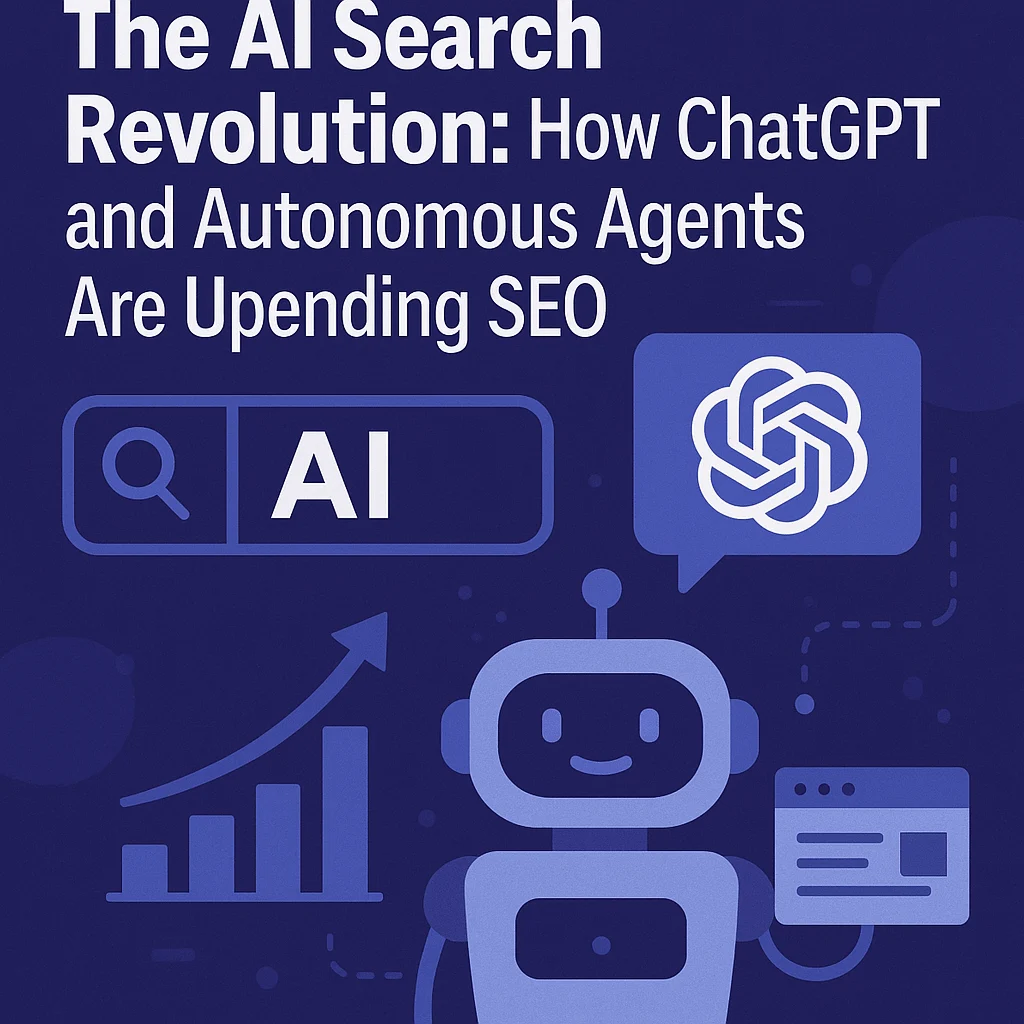It’s mid-2025, and a marketing director checks her analytics in disbelief. Website traffic from Google is plummeting – not due to a traditional algorithm update or a new competitor, but because potential customers are getting instant answers from AI chatbots without ever clicking a link. This isn’t science fiction; it’s the new reality at the intersection of SEO and AI. Search behavior is shifting under our feet, powered by large language models (LLMs) like ChatGPT and Bard that can answer questions directly. In this brave new world, where algorithms learn from vast data and even write content themselves, the rules of SEO are being rewritten in real-time. How did we get here, and where are we headed next?
From Search Engines to Answer Engines: The New Age of Search
For two decades, Google has been the unified gateway to the web. Want information? “Just Google it.” But today, generative AI is transforming search engines into answer engines. Tools like ChatGPT gained over 100 million users in mere months after launch, a growth curve faster than almost any platform in history. Instead of typing keywords into Google, millions now turn to AI chatbots for immediate, conversational answers. This seismic shift hasn’t gone unnoticed: Google’s search traffic hit record lows in early 2023 and even a modest-sounding 1.5% drop in global search volume represents billions of queries moving elsewhere.
The ripple effects are dramatic. In late 2022, alarm bells rang in Mountain View as Google’s CEO Sundar Pichai issued a high-priority “Code Red,” recognizing the threat of AI chat tools to Google’s core business. Google’s response was swift: by February 2023 they unveiled Bard, their own AI chatbot integrated with search results, as part of an all-hands-on-deck effort to infuse AI into everything. As Pichai put it, “AI is one of the most profound things we’re working on… more profound than fire or electricity”. Even Microsoft’s Bill Gates weighed in, calling the rise of AI “as fundamental as the creation of the internet itself”. High praise – and high stakes – for the technology now reshaping how we find information.
Disrupted User Behavior: ChatGPT Steals the Search Thunder
Users aren’t just experimenting with AI chatbots – many are preferring them. A 2023 analysis noted one power-user’s Google queries dropped as they leaned on ChatGPT (and even StackOverflow saw less traffic) once AI could answer coding questions. Semrush research confirms this broader trend: after ChatGPT’s debut, traditional search engines like Google, Bing, and Yahoo saw notable traffic declines between 2022 and 2023
Meanwhile, alternative platforms surged – privacy-focused Brave Search reported triple-digit growth in users, and even TikTok became a de facto search engine for Gen Z
(In fact, nearly 40% of young people now use TikTok or Instagram for certain searches instead of Google
By 2024, ChatGPT was not just absorbing questions but driving traffic outward as well – OpenAI’s introduction of plugins and a browsing mode led to a 60% jump in ChatGPT-generated clicks to external websites within a few months
In other words, ChatGPT started to function like a new kind of search engine, one that talks back in full sentences.
Yet even as new gateways emerge, the giants aren’t toppled overnight. Google still boasts around 6 billion users and retains a search market share north of 90%. YouTube, the world’s second-largest search platform, has about 3.5 billion users. These incumbents are fighting back on multiple fronts – from launching AI-infused features to leveraging their massive data advantage – but the cracks in the monopoly have appeared. The search landscape that was once a Google monoculture is evolving into an ecosystem of diverse AI-driven gatekeepers. In short: search is no longer a one-way street of users -> Google -> websites. Now there are many new routes, detours, and stop-offs along the journey for information.
Enter Google’s AI Counterstrike: SGE and the New SERP
Knowing they needed to innovate or lose relevance, Google shifted into high gear with AI. The result is the Search Generative Experience (SGE) – an experimental AI overhaul of the familiar Google results page. Instead of the classic list of blue links, certain queries now trigger a dynamic AI-generated summary at the very top of the page. These AI snapshots pull information from multiple sources and present a conversational answer to your question, often with cited sources listed next to the summary. Google essentially aims to answer the query directly on Google itself, so users might not need to click any result. It’s Google’s bid to become an “answer engine” rather than just a search engine.
From a user perspective, SGE promises speed and convenience – “high-quality information faster, in easily digestible snapshots, with helpful follow-up suggestions”. But for SEO professionals and content creators, SGE set off alarm bells. If Google gives away the answer up front, who clicks through to our sites? Early research in 2024, while SGE was still in Labs, predicted significant drops in organic traffic. In fact, some sites braced for a staggering 20–60% decline in organic clicks for affected queries. When SGE’s AI overviews rolled out in May 2024, those fears started becoming reality: a huge block of AI-generated content, often 1,700+ pixels tall, now pushes traditional search results far below the fold. Even the #1 organic listing effectively got demoted on the page by this giant AI answer, which can reduce visibility by over 100% (meaning a user has to scroll significantly more to even see the first natural result).
Google is, of course, aware of the tension here. They have tried to mitigate publisher concerns by citing sources in the AI snapshots and including links. But if the AI summary fully answers the query, many users won’t feel the need to click those source links. To complicate matters, Google also injects ads into SGE results when relevant, finding new spots to monetize answers. It’s a delicate balance: Google must satisfy users (who love quick answers) while keeping content creators and advertisers (who fund the web ecosystem) happy. The rollout is ongoing and not yet global, but it foreshadows a future where earning clicks will be even harder. SEO strategy will need to optimize not just for ten blue links, but for AI visibility – a concept we’ll return to shortly.
Autonomous Agents: SEO Meets the AI Sidekicks
Just as marketers wrapped their heads around chatbots answering questions, another AI twist arrived: autonomous agents. These are AI programs like Auto-GPT and BabyAGI that can perform multi-step tasks by themselves, chaining together reasoning and tool use to achieve a goal. Think of them as Siri or Alexa on steroids – not only can they fetch an answer, but they can take actions (like researching a topic, drafting an email, or even coding a simple app) with minimal human guidance. In an SEO context, autonomous agents are starting to handle tasks such as content generation, keyword research, and even whole campaign planning on their own. For example, give an agent a target keyword and it might scour the web for related questions, generate an outline, and write a first draft of an article before a human even wakes up in the morning.
The appeal for SEO work is obvious: automation at scale. Early adopters report improved efficiency in creating content and analyzing data. An AI agent doesn’t tire; it can crunch analytics all night and spit out insights by dawn. It can monitor your rankings, spy on competitors, or tweak your title tags on the fly. But handing the keys to an autonomous AI comes with a big asterisk: these agents are still prone to errors and quirks. The current error rate for Auto-GPT, one popular open-source agent, is estimated between 15–30%. That means out of several tasks it attempts, a fair chunk could be misfires – anything from minor inaccuracies to executing the wrong task entirely. One can imagine an overzealous SEO agent accidentally optimizing the wrong keywords site-wide or making flawed content updates if left unchecked. Essentially, they do exactly what they’re told, which isn’t always what we intended.
The rise of autonomous agents has a two-fold implication for SEO. On one hand, AI is a tool for SEOs – helping professionals work faster and smarter. On the other, AI is a force acting on the search ecosystem itself – because an agent that can research and summarize might bypass search engines altogether. Consider a future scenario: a CEO asks their AI assistant (which has access to the company’s data and the web) to analyze the top 10 competitors and produce a report. The AI might directly visit those competitor sites, parse their content, and never once trigger a Google search. In that world, your content still needs to be visible – but not just to human eyes or Google’s web crawler. It must be digestible to the AI agents doing the reading. This is why forward-looking SEO experts are now talking about things like knowledge graphs and schema markup as critical tools – to feed structured information that AIs can easily ingest. The SEO game is expanding: it’s no longer just B2C or B2B, but also B2A – business to AI.
Ethical Quicksand: Misinformation, Bias & Black Box Algorithms
With great power comes great responsibility – and sometimes, great mistakes. AI-driven search has had some very public stumbles. Who can forget the demo disaster when Google Bard, in its first showcase, confidently spouted a false fact about the James Webb Space Telescope, an error so glaring it wiped $100 billion off Alphabet’s market value in two days. The incident underscored a key risk: these AI systems sound authoritative even when they’re wrong. Unlike a traditional search results page (where you might see one sketchy result among reputable ones and judge accordingly), an AI synthesized answer doesn’t always make it obvious which part is drawn from verified knowledge and which part is the AI’s hallucination.
Research from the Center for an Informed Public highlighted how generative search can sometimes just make stuff up out of thin air. In one analysis, an AI-powered search result conflated unrelated statistics and cited a real news article as the source – even though that article never actually contained the AI’s claim. The AI had effectively created a Frankenstein fact, stitched from bits and pieces, and given it a legitimate citation. In another example, the generative engine listed supposed “benefits of nicotine” with a citation, but the cited source was actually about the addictive dangers of smoking. These aren’t just anecdotal glitches; they reveal a systemic issue. By design, LLMs are “stochastic parrots,” to borrow the famous term by Bender et al., stringing together words based on probability, not factual understanding. They have no built-in mechanism to distinguish truth from falsehood – they only know what sounds plausible. As a result, AI-driven search can blur fact and fiction in ways search engines typically do not. A traditional Google query at least shows you sources (which you can vet); a chatbot might state incorrect info with a misplaced air of objectivity.
Bias is another thorny challenge. Search engines have long grappled with bias in results, but generative AI can reinforce biases in new ways. If an AI has been trained on content that under-represents certain viewpoints or demographics, its answers will reflect those skews. For instance, an AI might systematically favor sources from one country or echo prevailing social biases present in its training data. Even more insidious is confirmation bias: some experimental chat-based search systems were found to tailor their answers to a user’s presumed viewpoint, creating a kind of echo chamber. If you ask a medical question and the AI knows you’ve shown interest in homeopathy, perhaps it overemphasizes those remedies in its answer, whereas a different user might get a skeptically scientific answer. Over time, highly personalized AI results (while convenient) might silo people in their own information bubbles more than ever.
Then there’s the issue of transparency and provenance. Google’s SGE provides citations, but not all AI search implementations do. When an AI aggregates info without listing sources clearly, users lose the ability to double-check origin or trustworthiness. As one report noted, generative search engines often “obscure the provenance of information”, making it hard to know where facts are coming from. This is problematic for critical topics – health, finance, news – where source credibility matters. It’s also a content ownership nightmare: publishers worry their content will be scraped and used to give answers without driving any traffic back (a major complaint news outlets have raised with Google’s SGE and similar features). If an AI summarizes the entirety of, say, a recipe or a how-to guide, is it fair use or just straight-up content theft? These debates are just beginning, but they have already prompted some sites to block AI crawlers and sparked talk of legal challenges about training data and scraping.
On the ethical AI development front, even the tech companies see the minefield. Google in 2018 published its AI Principles emphasizing fairness, privacy, and avoiding harmful biases
They’ve set up internal AI ethics review teams and pledged to test systems for unintended biases
For example, Google now requires any politically oriented AI-generated content (like election ads made with AI) to be disclosed clearly. And after years of webmasters fearing Google would penalize AI-written content, the search team finally clarified in 2023-24 that AI-generated text is acceptable as long as it’s high-quality and helpful. In Google’s eyes, the sin isn’t using AI; it’s churning out spammy, low-value pages (which happen to often come from cheap AI use). They even hinted at technical solutions like watermarking AI content or metadata to help detect AI text and ensure it meets guidelines. Still, the onus is on creators to use these tools responsibly. An AI can just as easily be wielded for black-hat SEO – generating hundreds of junk pages, cloaking content, spinning nonsense keyword-stuffed articles at a scale a human never could. If abuse of AI becomes rampant, we could see search engines crack down hard, perhaps with new forms of penalties or AI-detection algorithms (the cat-and-mouse game of SEO continues).
The Future: SEO for the AI-First World (Bold Predictions Ahead)
Where is all this headed? It’s a question every marketer, SEO pro, and business leader is asking. While we don’t have a crystal ball, we can venture some bold takes based on current trends:
Personalized AI results will shatter “universal” rankings
One-size-fits-all search rankings may become a thing of the past. As AI search assistants carry on conversations with users, they’ll remember preferences and context. A Yext executive predicts “AI’s conversation memory will end universal search rankings”, meaning what you see could vastly differ from what I see. If your AI knows you’re allergic to nuts, it might always rank nut-free products higher for you. If it knows I value locally-owned businesses, my AI search results will highlight those. This hyper-personalization means SEO strategies must cater to multiple personas and contexts. The old game of getting to #1 for a keyword might be replaced by the game of getting recommended by the AI in each niche scenario.
The rise of LLMO – Large Language Model Optimization
Enter the new acronym. Just as SEO (Search Engine Optimization) dominated the last 20 years, LLMO could dominate the next. LLM Optimization means making your content and brand visible and enticing to AI models that generate answers. It’s a mix of data structuring, content strategy, and digital PR. Concretely, this could involve ensuring your company’s knowledge graph entries are complete and accurate (so AI has quality facts about you), publishing content in formats AIs can easily parse (clear sections, schema markup, FAQ lists), and even feeding AI models data directly via APIs. One LinkedIn analyst quipped that while SEO is about pleasing Google’s algorithm, LLMO is about ensuring ChatGPT knows your brand’s story. We’re already seeing guides on “how to rank in AI answers” – for instance, strategies like: get your brand mentioned in authoritative articles (that AI trains on), create Q&A content that might be used in chat answers, and cultivate online reviews or discussions (since AI often draws on public sentiment). It’s early days, but expect LLMO to become a hot topic, as forward-thinking marketers experiment with getting their content chosen by AI systems. In a way, we’ll be optimizing for two audiences: the end-user and their AI sidekick.
Multiple search ecosystems and the end of the Google monopoly
As AI capabilities spread, we may witness a splintering of how people search. Already, we have parallel universes: the traditional search engines (Google/Bing), the AI chatbots (ChatGPT, Bing Chat, Bard), and even domain-specific AIs (imagine a legal AI for law questions, a medical AI for health info). In 2030, it’s plausible that no single platform has a stranglehold on search. Google will either successfully integrate AI to retain users, or users will fragment across specialized tools. This means SEO might become platform-specific. Just as companies today optimize for Amazon if they sell products there (Amazon SEO), tomorrow you might optimize answers for different AI platforms. Perhaps ensuring your content is well-represented in the training data of an open-source healthcare AI, or working with Apple or others if they launch an AI search assistant for iOS. In short, the monopoly era could give way to a network of search agents. SEO would then be about being visible on all the channels people use to query: search engines, chatbots, voice assistants, AR glasses, and so on.
Content authenticity and trust as kingmakers
In a future where AI can generate endless content, the real currency will be trust and authenticity. Google’s ranking algorithms increasingly emphasize E-E-A-T (Experience, Expertise, Authoritativeness, Trustworthiness). AI or not, content that demonstrates real expertise and is backed by genuine authority will stand out. We might see new verification mechanisms – like digital signatures for content created by verified experts, or watermarks to distinguish human content – that search algorithms (and AI models) favor to combat the deluge of auto-generated fluff. Brands that build trust will have an edge: if your website is known for original research, AI will be more likely to quote it. If your brand has a strong positive reputation online, AI might preferentially include it in answers (consciously or via the data). Conversely, the cost of cheating (with spam or AI plagiarism) could go up – one major AI-driven plagiarism scandal could tank a brand if it goes viral. Savvy businesses are already putting guardrails on their AI content use to avoid crossing ethical lines.
New metrics and KPIs for search success
As traffic and ranking dynamics change, SEOs will evolve how they measure success. If fewer clicks happen due to AI answers, traditional metrics like click-through rate (CTR) and even organic traffic volume might decline in usefulness. Instead, we might track “presence in AI answers” – e.g., how often does our brand/content get mentioned by ChatGPT or Bard for relevant queries? Some are dubbing this “share of voice in AI.” Another metric could be conversion by assistant: e.g., tracking if users who come via an AI referral (like an embedded link in a chatbot answer) convert at higher or lower rates. User engagement might happen without a click (someone could get an answer about your product via AI and then directly navigate to your site later or walk into your store). So attribution models will need to expand to capture these indirect effects. Companies may even launch campaigns targeted at AI – for instance, feeding an AI lots of info about a new product so that it “knows” about it when users inquire. It’s a strange new game of influence.
In this whirlwind of change, one thing is clear: SEO isn’t dying, it’s evolving. As one AI expert aptly put it, SEO is “finally becoming something different”, not the same game we’ve played for 25 years. The core mission – connecting people with information they need – remains. But the players, the playing field, and the rules are all in flux thanks to AI. This creates immense opportunity for those bold enough to adapt and experiment, and peril for those who cling to the status quo.
Conclusion: Adaptation and Opportunity in the AI-SEO Era
The intersection of SEO and AI is one of the most exciting and unpredictable frontiers in digital marketing today. It’s provocative and a bit unnerving: content creators must grapple with AI “readers” as well as human ones; search engines are morphing into content generators; and the very definition of a “search result” is up for debate. Yet, amid the disruption, there’s a chance to leap ahead. Marketers and SEOs who embrace these AI tools can supercharge their productivity and insight generation. Brands that stay informed about AI-driven shifts in user behavior can pivot their strategies to meet customers where they are – whether that’s in a chat box, a voice assistant, or an augmented reality interface we’ve yet to imagine.
History has shown that those who adapt fastest to technological waves often ride them the farthest. The companies that optimized for mobile early reaped rewards when mobile searches overtook desktop. Now, those who optimize for AI – both in leveraging AI to improve content and in tailoring content for AI-driven discovery – stand to lead in the next era of search. The key is to remain user-centric and ethical, even as we use cutting-edge tech. AI may change how people find answers, but it doesn’t change why they search: to learn, to be inspired, to solve problems. If your content can fulfill those needs better than anyone else’s – whether read by a human or summarized by an AI – you will thrive.
The SEO/AI revolution is here, and it’s global. From Silicon Valley boardrooms to small business owners in developing markets, everyone will feel its impact. It’s our job as digital pioneers to ensure this revolution is a positive one – where information becomes more accessible, knowledge-sharing more efficient, and human creativity augmented (not replaced) by our new AI allies. The world is asking questions in new ways; it’s time for us to answer.



